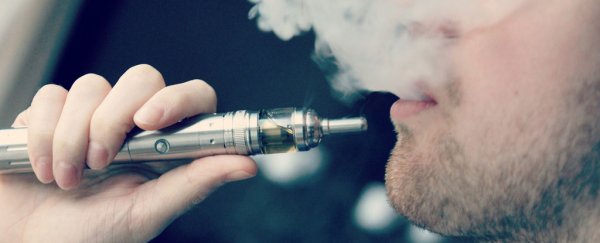Health authorities in Britain have officially licensed an e-cigarette product to be sold as a medication to help smokers quit traditional cigarettes, meaning a vaping device can now be legally prescribed by doctors through the UK's state-funded National Health Service.
The product in question, e-Voke by British American Tobacco, is the first vaping device to secure such a licence, which was granted at the end of last year, according to a report by Kate Kelland at Reuters.
While the green light could be seen as controversial – especially since one of the world's biggest tobacco brands is now the manufacturer of a licensed quitting medicine – the UK's Medicines and Healthcare Products Regulatory Agency (MHRA) says the decision to regulate e-cigarettes more closely is in the interests of people who may use such products to quit smoking.
"We want to ensure licensed nicotine-containing products – including e-cigarettes – which make medicinal claims are available and meet appropriate standards of safety, quality and efficacy to help reduce the harms from smoking," the MHRA said in a statement on Monday.
Despite the licensing, many in the health community remain concerned about the potential risks of vaping, which is still a relatively new habit, the long-term effects of which have yet to be fully investigated by scientists.
Recent results of numerous studies on the effects of e-cigarette use warrant close and continued monitoring – particularly of the types of chemicals used by certain brands - with researchers last year discovering that e-cigarette vapour damages the immune systems of mice and that many vaping flavourings contain chemicals linked to the 'popcorn lung' disease.
But nonetheless, the view in many quarters remains that e-cigarette usage is still a safer alternative to people smoking tobacco-based cigarettes, which cause nearly 6 million deaths per year according to the US Centres for Disease Control and Prevention.
A government report issued by Public Health England last year concluded that e-cigarettes are 95 percent less harmful to people's health than normal cigarettes, and could be used to help most smokers quit tobacco altogether, although "[c]ontinued vigilance and research in this area are needed".
British Prime Minister David Cameron made headlines late last year when he himself endorsed e-cigarettes as a quitting aid, and admitted his own personal struggle with cigarettes.
"Certainly as somebody who has been through this battle a number of times, eventually relatively successfully, lots of people find different ways of doing it and certainly for some people e-cigarettes are successful," he said, as reported by Laura Hughes at The Telegraph. "So I think we should be making clear that this is a very legitimate path for many people to improve their health and the health of the nation."
And that legitimate path is expected to become more populated, in the UK at least, where e-Voke is unlikely to remain the only medicinal vaping brand on the market. According to Kelland at Reuters, the MHRA said it would "continue to encourage companies to voluntarily submit medicines licence applications for e-cigarettes and other nicotine containing products as medicines", meaning we may well see more vaping products licensed as medicines in the near future.
